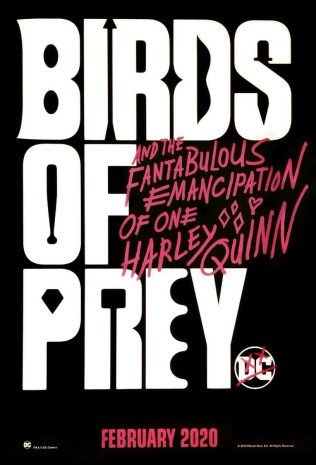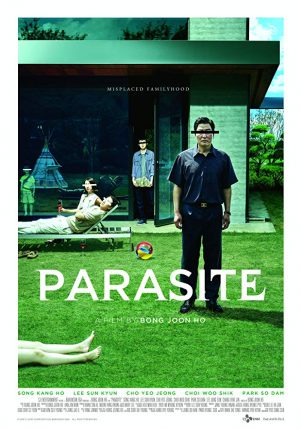The big movie-related issue right now? That would be the disappointing February 2019 opening of the SUICIDE SQUAD spin-off BIRDS OF PREY, for which Warner Bros. had (unrealistically) high expectations. The immediate result was an impromptu title change in movie theater listings (which depending on who you ask was either a decision made by theater owners on their own or one forced on them by Warners) to HARLEY QUINN IN BIRDS OF PREY. I’d argue that if the movie were truly worthwhile a name change wouldn’t be necessary, as many well received movies have been poorly titled (such as the currently-in-release PARASITE, more on which in a minute), but it is an incontrovertible fact that BIRDS OF PREY is a rotten title.
 The last time a situation like this one occurred was in 2014, when another Warner Bros. product, the Tom Cruise vehicle EDGE OF TOMORROW, was released. Like BIRDS OF PREY, it was burdened with a title that was widely blamed for the movie’s failure, and given an unofficial new one a couple weeks into its theatrical run: LIVE. DIE. REPEAT: EDGE OF TOMORROW. The problem there, as discussed in my 2014 essay on titles, was the fact that EDGE OF TOMORROW was an insufferably bland moniker. That may also seem like the case with BIRDS OF PREY, but the category here is a bit different; this title is actually, in light of the fact that its full name is BIRDS OF PREY: AND THE FANTABULOUS EMANCIPATION OF ONE HARLEY QUINN, a pretentious one, which is something I didn’t go into in the previous essay. Hence…
The last time a situation like this one occurred was in 2014, when another Warner Bros. product, the Tom Cruise vehicle EDGE OF TOMORROW, was released. Like BIRDS OF PREY, it was burdened with a title that was widely blamed for the movie’s failure, and given an unofficial new one a couple weeks into its theatrical run: LIVE. DIE. REPEAT: EDGE OF TOMORROW. The problem there, as discussed in my 2014 essay on titles, was the fact that EDGE OF TOMORROW was an insufferably bland moniker. That may also seem like the case with BIRDS OF PREY, but the category here is a bit different; this title is actually, in light of the fact that its full name is BIRDS OF PREY: AND THE FANTABULOUS EMANCIPATION OF ONE HARLEY QUINN, a pretentious one, which is something I didn’t go into in the previous essay. Hence…
BIRDS OF PREY: AND THE FANTABULOUS EMANCIPATON OF ONE HARLEY QUINN sounds like something from the 1960s and 70s, when ungainly compound titles riddled with “ors” and “ands” were commonplace. Some of them worked (DR. STRANGELOVE OR HOW I LEARNED TO STOP WORRYING AND LOVE THE BOMB, THE INCREDIBLY STRANGE CREATURES WHO STOPPED LIVING AND BECAME MIXED-UP ZOMBIES) and some didn’t (WHO IS HARRY KELLERMAN AND WHY IS HE SAYING THOSE TERRIBLE THINGS ABOUT ME?, CAN HEIRONYMOUS MIRKIN EVER FORGET MERCY HUMPPE AND FIND TRUE HAPPINESS?). I’d place BIRDS OF PREY ETC. in the latter category, it being a title that’s too long, too esoteric (there’s at least one word in it that I guarantee the film’s target audience won’t understand) and too pleased with itself by far, as proven by the fact that audiences and theater owners are only utilizing the first three words and completely ignoring the rest.
BIRDS OF PREY certainly isn’t the only example of a recent film saddled with a crummy title. Bong Joon Ho’s PARASITE is another, with the major difference between this and BIRDS OF PREY being that Bong’s film is a marked success. Granted, it’s a foreign film, meaning it operates under an entirely different set of rules than a would-be blockbuster, but PARASITE deserves credit for enticing audiences who, I’d argue, showed up despite rather than because of its title.
PARASITE is a reasonably accurate generalization of what occurs in the film it graces, but that word has a fairly specific meaning. It makes sense when used, properly, as a noun, as in the 1982 horror movie PARASITE and the similarly titled 2013 Mira Grant horror/sci fi novel, but here, where it functions more as an adjective, it’s a bit misleading (I’ve been asked by several people if the Bong Joon Ho PARASITE is a horror or science fiction movie—answer: it’s neither).
Might the film’s original Korean language title GISAENGCHUNG have been a better moniker under which to release the film in the English- speaking world? I ask this in the spirit of, once again, the 1960s, the time of America’s so-called foreign film renaissance. Much has been made about the alleged “game-changing” success of Bong’s film, but back in the ‘60s foreign films had an impact on the US box office comparable to, if not greater than, that of PARASITE.
speaking world? I ask this in the spirit of, once again, the 1960s, the time of America’s so-called foreign film renaissance. Much has been made about the alleged “game-changing” success of Bong’s film, but back in the ‘60s foreign films had an impact on the US box office comparable to, if not greater than, that of PARASITE.
It’s a fact that for at least two decades after its initial 1961 American release Federico Fellini’s LA DOLCE VITA was included in Variety’s 50 top grossing North American film listings, a feat it accomplished under its original Italian language title (and not the English language translation THE SWEET LIFE). Ditto other 1960s era classics like L’AVVENTURA (which translates as THE ADVENTURE), LE TROU (THE HOLE), YOJIMBO (BODYGUARD), LA CHINOISE (THE CHINESE) and BELLE DE JOUR (BEAUTIFUL WOMAN OF THE DAY).
In all cases the exoticism of those foreign titles was arguably crucial to their success. If, as one critic stated on a DVD commentary track for Pathfinder Entertainment’s CLAUDE CHABROL COLLECTION (speaking, ironically, against the practice of untranslated foreign titles), a title is a “come-on,” then those titles deliver, being far more enticing than their comparatively unexciting English translations. An especially telling example is Chabrol’s lesbian themed 1968 film LES BICHES, whose US viewers very likely interpreted those words far differently than they would have its literal English translation THE DOES (and what’s more, they’d have been at least partially correct in their reading, as in France “lesbiche” is a slang term for lesbian).
In more recent years, alas, the practice of releasing foreign films in the US under their original titles has largely been abandoned. Hence the unfortunate situation with PARASITE, which is burdened with a title that isn’t all it could be, and will likely affect the film’s box office intake at least slightly. As for BIRDS OF PREY ETC., I feel that, simply, its deep-pocketed makers really should have known better.
